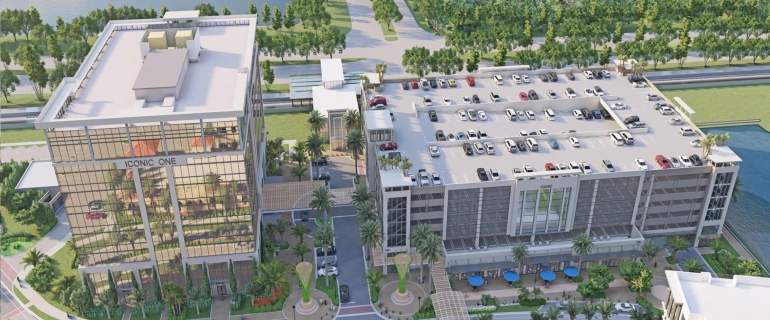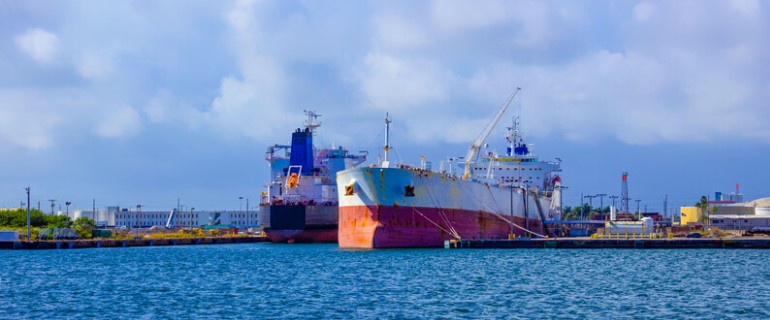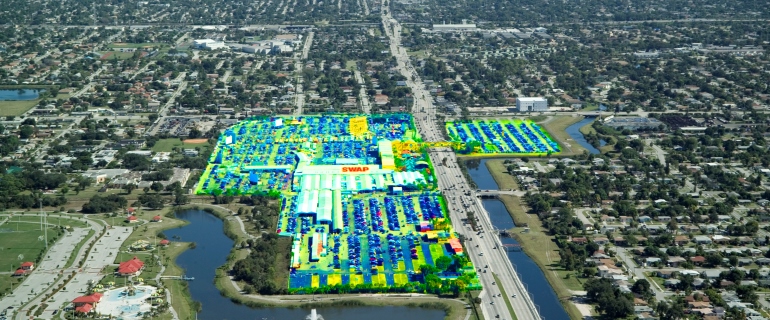Bargain hunters who head to the Swap Shop — the unusual decades-old shopping destination in South Florida — may start seeing its surrounding neighborhood spruced up with a string of redevelopment projects.
Lauderhill is eyeing properties around town, preparing to buy real estate, bring in food markets for lower-income areas and clean up a deteriorating part of the city.
A proposal calls for creating a newly expanded redevelopment area of 186 acres that includes the landmark Swap Shop at 3291 W. Sunrise Blvd. The venue opened in 1963 as the Thunderbird Drive-In Theater, with just one movie screen. The main building opened in 1979.
Today the Swap Shop’s drive-in theater is closed, but it has scores of retail vendors hawking shoes, clothing, electronics, jewelry, knives, among other items, and services such as a barbershop and produce stands. The region, which also includes gas stations, rests along a prominent corridor just west of Fort Lauderdale, by West Sunrise Boulevard, west of Northwest 31st Avenue.
“The corridor is a bit neglected,” acknowledges Sean Henderson, Lauderhill’s Community Redevelopment Agency director and deputy finance director.
In addition to the Swap Shop, there are various other types of businesses in the area: Northwest 31st Avenue “contains numerous junkyards, automotive repair facilities, and the Wingate landfill and incinerator,” according to a city memo.
As Lauderhill aims to redefine the eastern part of the city to take advantage of tax benefits allowed under state law, it has a challenge that could take years to overcome. To pull it off, the Lauderhill CRA is asking Broward’s county commissioners Tuesday to sign off on an expansion of its territory.
The plan would allow the Lauderhill CRA to benefit from tax increment financing, which is the money the agency gets in addition to property taxes from increases in the redevelopment area’s assessed value. The more the value of property goes up, the more money the CRA gets for additional projects.
Among the city’s goals:
- Food Services: Attract grocery stores and “sit-down” restaurants. “We want a diversity of food options, not just Kentucky Fried Chicken,” Henderson said. He said the area is defined as a food desert, a federal government designation of places where people have trouble getting affordable, fresh, nutritious food.
- Redevelopment: Buy properties “and do something with it,” Henderson said. The land will be scouted clandestinely (”we have third parties go for us,” Henderson said) to avoid property owners trying to jack up prices to benefit from government’s deep pockets. New land could mean pairing with developers for much-wanted projects.
- Beautification: Clean up areas by picking up litter and adding landscaping.
In the mid-2000s, the city annexed the Swap Shop along with three communities — St. George, West Ken Lark and Broward Estates.
“With the new CRA expansion, it would also mean focusing on the Swap Shop property although not immediately,” Henderson said. “But there’s always possibilities. The city’s vision could include a mid-town on the Swap Shop land — which is on both sides of Sunrise Boulevard — with new housing and shops.”
But there are contingencies, he said, of the land’s requirement for it to stay a Swap Shop, at least for now. Preston Henn, the former owner who died in 2017, became a multimillionaire from the shopping venue. The Swap Shop is bequeathed to his family with one condition, Henn told the Sun Sentinel in 2013.
“They have to keep it for 20 years — it’s in the will,” Henn said.
Henderson called the Swap Shop an “incubator of small business” and there was a “possibility” some of those businesses could be coaxed to set up “retail spots within the community.”
He said he’ll meet with the Henn family at some point to “share a vision” of the “wishes and dreams of the city” and work to determine “their intent with the property.” If the Henn family wants to continue to maintain it status quo, the CRA will work with them to make it “the best Swap Shop it can be.” Henn’s family, which is now running the business, could not be reached for comment.
The current land already in the Lauderhill CRA’s redevelopment area is 446 acres, generally confined by State Road 7, Sunrise Boulevard and Northwest 19th Street. The expansion would bring the corridor to Plantation’s border at Broward Boulevard and include the Swap Shop on Sunrise Boulevard.
The proposed boundaries of the expansion are an extension of the existing State Road 7 CRA along West Sunrise Boulevard to Northwest 31st Avenue encompassing the Swap Shop. The boundaries are further expanded to include the commercial properties along 31st Avenue from 19th Street to Broward Boulevard, from the corner of Broward and 31st Avenue to the Lauderhill and Plantation Boundary to the west.
While any improvements to the overall neighborhood are embraced, the Swap Shop customers’ reaction to any kind of flea market adjustments was mixed. Orse Joseph, a shopper from Fort Lauderdale, arrived one cloudy morning to buy lemons and rice. She found the idea of redevelopment of the site intriguing, especially because she sees vendors struggling.
“Change is better,” Joseph said. “So many shops are closing.”
But another shopper, Elizabeth Paulin, was taken aback by the idea. She’s a regular at the Swap Shop to buy “exotic” fruits and vegetables including mangoes and avocadoes that come from the sellers’ backyards. She also has tried mabi, a drink that comes from the bark of the Mauby tree, which reminds her of root beer. She said it’s an international experience as she chats with new immigrants, and has made out Russian, Canadian and Haitian music on the speakers.
On this day she loaded a push cart with her purchases including a new-to-her pair of used pants with palm prints for 99 cents, and a picture frame. She frequents the Swap Shop as often as once a week for the last two decades and has gotten on a first-name basis with both shoppers and vendors. So Paulin, a retired nurse from Wilton Manors, doesn’t want to see anything changed.
“I never want it to close,” Paulin said. “That’s horrible to think that. It’s a hometown place. Everybody knows everybody.”
Source: SunSentinel




